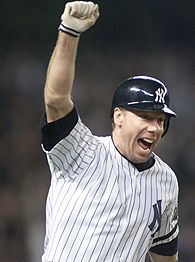 I’m very ambivalent about the modern postseason. Having an eight-team, three round playoff has two primary effects from a business perspective. On one hand, it generates tons of cash, both by increasing the supply of a highly demanded product and by keeping more teams (and therefore fans) involved in pennant races longer into the season. From a financial perspective, realignment and the addition of the wild card have been tremendous successes.
I’m very ambivalent about the modern postseason. Having an eight-team, three round playoff has two primary effects from a business perspective. On one hand, it generates tons of cash, both by increasing the supply of a highly demanded product and by keeping more teams (and therefore fans) involved in pennant races longer into the season. From a financial perspective, realignment and the addition of the wild card have been tremendous successes.
On the other hand, this format goes a long way toward killing the significance of the “World Championship.” The goal in sports is to be the best. In an eight-team baseball playoff, the best team rarely comes out on top. This significantly changes the task at hand for baseball operations departments. Whereas teams were once incentivized to try to be the best in their league, it now makes more sense to be in the upper middle class and hope for the best.
The amazing aspect of this is that baseball is having its cake and eating it too. People seem to really believe that the best team in the end will win the World Series, and that teams that don’t have something intrinsically wrong with them. After all, if fans had actually lost confidence in the system, would anybody be watching?
Living in Manhattan, I have more arguments about this issue than any other. Everyone has a theory on why the Yankees haven’t won a World Series in seven years: A-Rod can’t hit in the postseason, Joe Torre lost his touch, they just didn’t have the pitching this year, etc. Nobody wants to believe it could be dumb luck. That’s not how sports work, they inevitably say. The guys who step it up in October are the ones with the cojones, like Scott Brosius.
But as always, data speaks louder than words. Since the start of divisional play, the team with the best record in baseball (if there was a tie, I used the team with the most postseason success, to be generous) has won the World Series nine times (including this year’s Red Sox). If we set up a predictive model where every team in the postseason has the same chance of winning, we would have expected these teams to have won eight times in this span.
There is some evidence, though, that the best teams generally do well in the divisional and league championship rounds. The model would predict that a randomly selected team would have made it to the World Series fifteen times, but the best regular season team actually made it twenty-two times. However, of those twenty-two appearances, the best team actually won only those nine already mentioned.
Before divisional play, sixty-five World Series were held, with the “best” team winning thirty-six times, or just over 55 percent. That seems about right, although I’d bet most baseball fans would bet the over.
In reality, its not a total crapshoot, but it’s much closer than people think. And I hate to say it, but I’m less and less excited about the playoffs every year. It’s nice that a team like the Red Sox, perhaps the best run team in professional sports from ownership on down, can have the success that they’re having. But in the end, most fans won’t try to differentiate between them and the 2006 Cardinals, a far inferior team that just got hot at the right time.
Feedback? Write a comment, or e-mail the author at shawn(AT)squawkingbaseball.com
Add New Comment